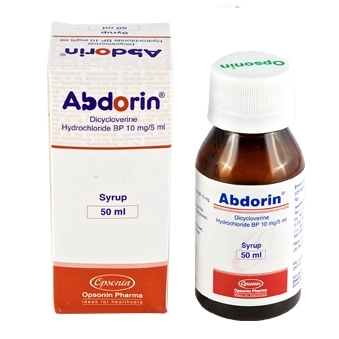50 ml bottle:
৳ 30.11
This medicine is unavailable
Also available as:
Indications
Abdorin is indicated in:
- Functional bowel/irritable bowel syndrome
- Urinary incontinence secondary to unstable detrusor muscle
- Infantile colic
- GIT spasm
- Colicky abdominal pain
- Diverticulitis
- Abdominal colic
Pharmacology
Dicycloverine hydrochloride is an antispasmodic and anticholinergic (antimuscarinic) agent. Chemically, it is [Bicyclohexyl-]1-carboxylic acid, 2-(diethylammo) ethyl ester, hydrochloride. Dicycloverine relieves smooth muscle spasm of the gastrointestinal tract. Dicycloverine HCl Injection is a sterile, pyrogen-free, aqueous solution for intramuscular injection (Not For Intravenous Use). It works at specific receptors, called cholinergic (or muscarinic) receptors, located on the involuntary muscle in the walls of the gut. By binding to these receptors dicycloverine prevents certain chemicals produced by the body from interacting with these receptors. This causes the gut muscle to relax, relieving the pain of colic produced by gut muscle contraction and spasm.
Dosage & Administration
For oral dosage forms:
Children: Dose must be determined by the doctor.
- Adults:10 to 20 mg three times a day.
- Children over 6 months of age: 5 to 10 mg three times a day.
- Adults: Intramuscular injection. Not for intravenous use. The recommended intramuscular dose is 80 mg daily (in 4 equally divided doses).
Children: Dose must be determined by the doctor.
* চিকিৎসকের পরামর্শ মোতাবেক ঔষধ সেবন করুন
Side Effects
Insomnia, mydriasis, cycloplegia, increased ocular tension, urinary hesitancy, palpitations, dyspnea.
Pregnancy & Lactation
Pregnancy Category B. Dicycloverine was neither teratogenic nor embryocidal in animal trial. It, like other drugs should be used during pregnancy only if clearly needed. There are no data on the secretion of this drug into breast milk. Dicycloverine should be used cautiously in case of lactating mother.
Precautions & Warnings
Use with caution in patients with autonomic neuropathy, hepatic or renal disease, ulcerative colitis, coronary heart disease, congestive heart failure, cardiac tachyarrhythmia, hiatal hernia, known or suspected prostatic hypertrophy.
Overdose Effects
Toxic reaction seldom occurs with dicycloverine. The signs and symptoms of overdosage are headache; nausea; vomiting; blurred vision; dilated pupils; hot, dry skin; dizziness; dryness of the mouth; difficulty in swallowing; and CNS stimulation.
Therapeutic Class
Anticholinergics (antimuscarinics)/ Anti-spasmodics
Storage Conditions
Keep below 30°C temperature, away from light & moisture. Keep out of the reach of children.

